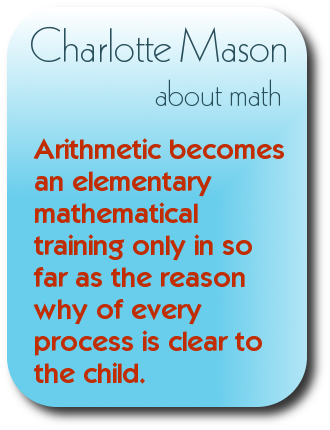
Miss Mason on the Math
The child may learn the multiplication-table and do a subtraction sum without any insight into the rationale of either. He may even become a good arithmetician, applying rules aptly, without seeing the reason of them; but arithmetic becomes an elementary mathematical training only in so far as the reason why of every process is clear to the child.
from Home Education, Vol. 1, Section 15 Arithmetic
My Thoughts
I was one of those students Miss Mason is talking about here. I could follow the rules and get the right answer without understanding anything of the mathematical principles.
To this day, I don’t consider myself “good” in math despite my good grades and even a short stint as a math tutor in college. Why? Because I know that I never grasped the concepts of the math. I simply parroted the progression of steps.
Understanding math is just as important as getting the right answer.
I have seen this time and time again in Emma’s math lessons. She will make strong scores in her Teaching Textbooks lessons. And then in the middle of a unit, she will come out saying, “I finally get it! It clicked!” Instantly, what was just following steps becomes an understanding of the math. Her scores may improve a little or they may be the same after that revelation, but that doesn’t matter to me. My concern is that she has that Eureka moment when she grabs hold of a math principle and adds another layer to her math confidence structure.
For younger students, math must be taught with concrete objects so that the understanding happens. Do not be in a hurry to put aside the counting bears. They are important learning tools not crutches.
Home Education is in the public domain and can be accessed in its entirety at Archive.org.
More Quotes in this Series
- The Value of Watching Bugs
- Loving God’s Word
- Why No Textbooks? Charlotte Mason on the Teaching of History
This quotes series is part of the iHomeschool Network Quotation Link-up.
This is exactly why I created Arithmetic Village! I noticed that even at university, other students learning to become teachers had not yet fully understood the CONCEPTS. Thank you for your thoughtful post!!
This is what frustrated me so much when I was at school. I couldn’t remember anything in maths until I understood why it was the case, and my teacher (who let it be said here and now was a grumpy, rude, unpleasant man) refused to ever explain things to me. I rebelled by refusing to take the higher-level paper that the rest of the class sat in the second year of GCSEs (end-of-school exams) and spent the time instead teaching myself to understand the maths they had skimmed over. Almost everyone failed the higher paper anyway, and I was glad I hadn’t bothered.
Hey Jimmie! My son struggles in Math when he hits a road block where he doesn’t understand the why/concepts of solving a problem. He’s 13 and we still use manipulatives for that very reason. Great post! Thanks for sharing your thoughts.
I was the opposite. I never heard of using manipulatives and such until the last few years. I just understood the concepts and could do the work. Unfortunately, two of my children have Dyscalculia and, not knowing there were other ways to teach math, they have floundered. This is because they didn’t have the tools, they have the disability, and we didn’t have a diagnosis yet. And yet I have one that is “genius” in math. Then there’s the youngest.. I barely begin explaining the concept before she’s had her “Eureka!” moment and finishes explaining it.
But yes.. they MUST understand the “why” behind it..or it’s pointless really.
Hi Jimmie! Just wanted to let you know that you’re one of my top 10 inspiring work at home moms. You’re such an encouragement and blessing to me!!
Well, I am so humbled by that, Ladonna. I’m actually going to post about homeschooling as a WAHM next week!